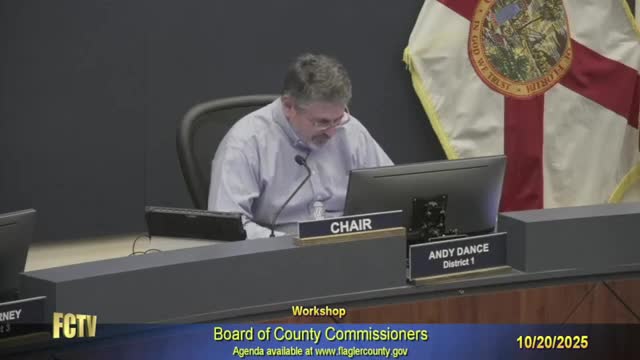Flagler County seeks plan to stabilize David Siegel Adult Day Care after staff outline costs and low utilization
Get AI-powered insights, summaries, and transcripts
Subscribe
Summary
Health and Human Services told the Board that the county-run David Siegel Adult Day Care is licensed and medically staffed but operates at about nine clients per day and costs roughly $98 per client-day; commissioners asked staff to return in January with budget scenarios and a sustainability plan.
At a Flagler County Board of County Commissioners workshop on Oct. 20, 2025, county health and human services staff reviewed operations and finances for the David Siegel Adult Day Care and were directed to return in January with budget options and a sustainability plan.
The presentation, led by Joe Hegatus, director of Flagler County Health and Human Services, described the center as the county's only state- and Medicaid-licensed adult day care and said it serves primarily older adults with Alzheimer's disease, dementia and related cognitive disorders. "We are here today to discuss the adult daycare program and our community service grants, both of which are under the health and human services umbrella," Hegatus said.
Staff said the program operates with roughly 4.5 full-time-equivalent medically trained staff (a registered nurse program manager, an LPN and certified nursing assistants) and averages about nine to 10 clients per day, with monthly enrollment typically in the low 20s. Hegatus told commissioners the program provides medication administration, some therapy referrals, activities and roughly 2,300 meals annually.
On costs, staff gave the board a multi-year snapshot: for fiscal 2023–24 the adopted budget was about $350,000 with actuals near $300,000; for 2024–25 the board-adopted budget was about $409,000 and staff said actuals were on track to be lower, with a staff-estimated final program cost near $224,000 for fiscal 2024–25. Hegatus also reported a per-client operating cost of about $98 per client per day and noted the county receives reimbursements from four Medicaid HMOs at roughly $60 per covered participant per day. The program's private-pay rate is currently $10 per hour (raised from $8 in 2023), and staff said roughly two-thirds of participants are private pay.
Commissioners and staff discussed options to improve sustainability. Board members asked staff to prepare a plan with concrete scenarios for the next budget cycle and the following year. The board's stated priorities for that plan included raising the private-pay rate (several commissioners suggested incremental increases to $12 then $14 per hour), increasing utilization (staff and commissioners discussed a target of roughly 17–19 clients per day to approach 70–80% capacity), pursuing available grant reimbursements such as the Alzheimer's Disease Initiative (ADI), and revisiting minimum attendance requirements and scheduling to improve efficiency. Hegatus said the program is budgeted through fiscal 2025–26 and that staff had already reduced operating costs by about $20,000 over two years.
Commissioners also raised nonfinancial concerns: multiple members noted the facility condition and questioned whether the building is cost-effective for current attendance levels. Dawn Lord, the adult day care program manager, said the four licensed medical staff provide a medically supervised environment and that the center offers therapeutic activities and socialization important for slowing cognitive decline. "We bill currently... we bill hourly in 15-minute increments," Lord said when commissioners asked about minimum-hour policy and billing.
Several commissioners urged staff to provide measurable targets and a timeline with interim milestones. The board told staff to return in January with a set of budget options and a sustainability plan staff could implement if the commission chooses to continue funding the program.
Ending: The board did not vote to close or to immediately cut funding during the workshop; instead commissioners asked staff to bring a detailed, optioned budget and operational plan in January so the commission can decide how to proceed during the next budget process.
